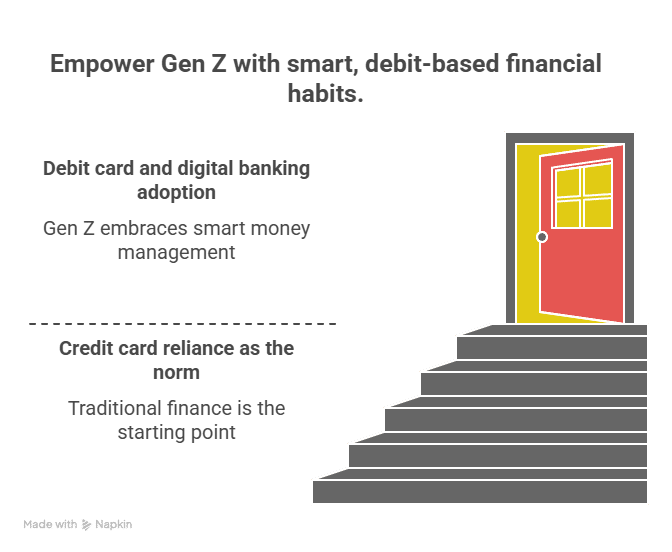Gen Z ditching credit cards is no longer just a trend—it’s a full-blown financial revolution in 2025.
With rising inflation, mounting student loan pressure, and the explosion of digital banking tools, Gen Z is rewriting the rules of money. This article explores why debit is king in 2025 and what it means for credit cards, banking, and the future of financial wellness in America.
“Gen Z ditching credit cards isn’t just a trend — it’s a generational shift that’s rewriting how young consumers manage money.”
In the past, getting your first credit card was seen as a rite of passage into adulthood. “Gen Z is ditching credit cards in favor of debit cards…” But today, many young Americans—specifically Gen Z—are breaking away from this tradition. Instead of relying on credit, they are gravitating toward debit cards and other forms of non-credit-based payment methods. This isn’t just a quirky trend—it’s a major financial shift with far-reaching implications for the future of banking, credit institutions, and consumer spending behavior in the United States.
So, what’s behind Gen Z’s move away from credit cards? Let’s explore the reasons, impacts, and what this shift means for businesses and the economy.
“This trend shows why Gen Z is ditching credit cards and moving toward smarter money habits.”
“As Gen Z continues ditching credit cards, budgeting tools like debit and digital banking grow in popularity.”

Want to learn how others turned their debt into financial freedom? Read our complete guide to achieving financial success from debt.
2025 Trends Fueling the Shift
Student Loan Repayments Resumed in 2025
With federal student loan repayments fully resumed this year, Gen Z is doubling down on avoiding extra debt. Many are choosing debit cards and budgeting tools to manage their monthly expenses without accumulating interest charges.
BNPL Oversight Grows
In 2025, federal regulations have tightened on Buy Now, Pay Later (BNPL) services. While still popular, Gen Z is becoming more cautious about splitting payments and leaning into tools that encourage upfront, honest spending.
The Rise of Debit Cards: Simplicity and Control
Gen Z, born roughly between 1997 and 2012, grew up in a time of economic uncertainty. They saw the effects of the 2008 financial crisis on their families and are now living through inflation, rising education costs, and housing affordability issues. Unlike older generations who saw credit cards as financial tools or status symbols, Gen Z views them with skepticism.
“One reason Gen Z is ditching credit cards is their preference for transparency in banking.”
“How Gen Z Ditching Credit Cards Impacts Traditional Banking”
Debit cards, in contrast, offer:
- Real-time spending control – You can only spend what you have.
- No interest or late fees – Unlike credit cards, there’s no risk of debt accumulation.
- Increased budgeting awareness – Many debit cards link directly to budgeting apps like Mint or You Need a Budget.
Mistrust in Traditional Financial Systems
Be inspired by how one single mom paid off her debt and regained control of her finances— read her full story here.
A significant number of Gen Z individuals report a lack of trust in traditional financial institutions. With the rise of online-only banks, fintech startups, and peer-to-peer payment apps like Venmo and Cash App, this generation is opting for services that feel more transparent, flexible, and mobile-friendly.
Many have learned from watching previous generations struggle with:
- Credit card debt.
- Mortgage crises.
- Poor credit impacting job or housing prospects.
Instead, Gen Z seeks financial freedom and education. Platforms like TikTok and YouTube have become major sources of personal finance advice, with influencers often encouraging living debt-free and building wealth through saving and investing rather than borrowing.
A recent Retail Brew survey found that 63% of Gen Z consumers have moved away from credit cards, favoring debit cards and BNPL services as their primary payment methods.
“Apps like Cash App and Venmo are fueling the Gen Z ditching credit cards movement.”
Financial institutions are closely monitoring how Gen Z ditching credit cards affects credit services and loan programs.
Credit Card Usage: Declining Among Gen Z
According to a 2024 Bankrate study, only about 30% of Gen Z adults say they use a credit card as their primary payment method. Compare that with over 50% for Millennials and nearly 70% for Gen X and Boomers. This drop isn’t just about preference—it’s about principle.
Here are a few reasons why:
- Fear of falling into debt traps.
- Low credit education—many schools still don’t teach how credit scores work.
- Preference for Buy Now, Pay Later (BNPL) services like Klarna and Afterpay over traditional revolving credit.
As reported by Forbes, Gen Z is intentionally “breaking up” with credit cards in favor of financial tools that offer transparency, real-time control, and fewer chances of spiraling into debt.
The Appeal of Fintech and Digital Banks
Digital banking has revolutionized how Gen Z manages money. Apps like Chime, Revolut, and Current offer debit cards, early paycheck access, and zero overdraft fees—all without requiring a credit history.
These platforms appeal by offering:
- User-friendly mobile apps.
- No hidden fees.
- Instant alerts and budgeting tools.
Traditional banks, still reliant on physical branches and outdated customer experiences, are falling out of favor.
Impact on Credit Scores and Long-Term Borrowing
Here’s the catch: While avoiding credit cards might feel like a smart move now, it could have consequences later. A credit history plays a big role in:
- Renting apartments.
- Getting approved for car loans or mortgages.
- Landing certain jobs (in industries that check credit).
So, financial experts recommend using credit cards strategically rather than avoiding them completely. For instance:
- Open a no-annual-fee card.
- Use it for small, regular purchases like Netflix or gas.
- Pay it off in full each month.
This helps build a strong credit score without falling into debt.
Brands and Businesses: Take Note
This generational shift means businesses must rethink how they market financial products. Gen Z doesn’t want rewards points on a flashy credit card—they want transparency, flexibility, and security.
Banks and credit card companies are starting to respond:
- Offering secured cards to help build credit safely.
- Promoting financial education content.
- Developing co-branded debit card experiences with Gen Z–focused influencers and apps.
Conclusion: The Future Is Debit—For Now
The trend of Gen Z ditching credit cards signals a long-term cultural shift in financial behavior.
Gen Z is changing the financial landscape. Their aversion to credit cards reflects broader values: authenticity, mindfulness, and financial independence. While credit cards aren’t going away anytime soon, their role in young adults’ lives is being redefined.
For now, debit is king.
But the smartest Gen Zers are finding a balance—leveraging the simplicity of debit cards with the long-term benefits of responsibly managed credit.


